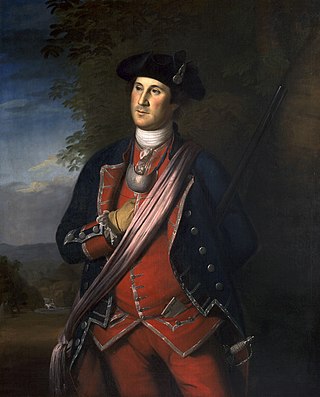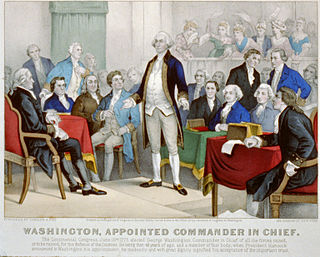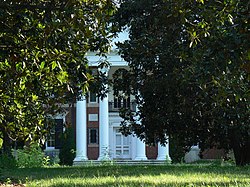
Robert Edward Lee was an American Confederate general during the American Civil War, toward the end of which he was appointed the overall commander of the Confederate States Army. He led the Army of Northern Virginia—the Confederacy's most powerful army—from 1862 until its surrender in 1865, earning a reputation as a skilled tactician.

The Army of Northern Virginia was the primary military force of the Confederate States of America in the Eastern Theater of the American Civil War. It was also the primary command structure of the Department of Northern Virginia. It was most often arrayed against the Union Army of the Potomac.

George Edward Pickett was a career United States Army officer who became a major general in the Confederate States Army during the American Civil War. He is best remembered for being one of the commanders at Pickett's Charge, the futile and bloody Confederate offensive on the third day of the Battle of Gettysburg that bears his name.

The Richmond Times-Dispatch is the primary daily newspaper in Richmond, Virginia, and the primary newspaper of record for the state of Virginia.

The American Civil War Museum is a multi-site museum in the Greater Richmond Region of central Virginia, dedicated to the history of the American Civil War. The museum operates three sites: The White House of the Confederacy, the American Civil War Museum at Historic Tredegar in Richmond, and the American Civil War Museum at Appomattox. It maintains a comprehensive collection of artifacts, manuscripts, Confederate books and pamphlets, and photographs.

Dumas Malone was an American historian, minister, and biographer. A professor by occupation, Malone spent the majority of his career teaching at the University of Virginia (UVA), where he served as the Thomas Jefferson Foundation Professor of History.

Douglas S. Freeman High School is a public high school located in the West End of Henrico County, Virginia. It is operated by Henrico County Public Schools.

Joseph White Latimer, "The Boy Major", was a promising young officer in the Confederate Army of Northern Virginia's artillery branch during the American Civil War. He was mortally wounded at the Battle of Gettysburg and died four weeks later.

George William Bagby was an American physician and humorist.

Gilbert Moxley Sorrel was a staff officer and brigadier general in the Provisional Army of the Confederate States.

William Ransom Johnson Pegram, known as "Willie" or "Willy", was an artillery officer in Robert E. Lee's Confederate Army of Northern Virginia during the American Civil War. He was mortally wounded in the Battle of Five Forks. He was the younger brother of Confederate General John Pegram, who was also killed in action. His grandfather, John Pegram, was a major general during the War of 1812.

George Washington's military experience began in the French and Indian War with a commission as a major in the militia of the British Province of Virginia. In 1753 Washington was sent as an ambassador from the British crown to the French officials and Indians as far north as present-day Erie, Pennsylvania. The following year he led another expedition to the area to assist in the construction of a fort at present-day Pittsburgh, Pennsylvania. Before reaching that point, he and some of his men, along with Mingo allies led by Tanacharison, ambushed a French scouting party. Its leader was killed, although the exact circumstances of his death were disputed. This peacetime act of aggression is seen as one of the first military steps leading to the global Seven Years' War. The French responded by attacking fortifications Washington erected following the ambush, forcing his surrender. Released on parole, Washington and his troops returned to Virginia.

George Washington commanded the Continental Army in the American Revolutionary War (1775–1783). After serving as President of the United States, he briefly was in charge of a new army in 1798.

George Burgwyn Anderson was a career military officer, serving first in the antebellum U.S. Army and then dying from wounds inflicted during the American Civil War while a general officer in the Confederate Army. He was among six generals killed or mortally wounded at the Battle of Antietam in September 1862.

WRNL is a commercial radio station licensed to Richmond, Virginia. WRNL features a sports radio format and is owned and operated by Audacy, Inc. The studios, offices and transmitter are all co-located just north of the Richmond city line on Basie Road in Dumbarton, Virginia.
This bibliography of George Washington is a selected list of written and published works about George Washington (1732–1799). A recent count has estimated the number of books about George Washington at some nine hundred; add scholarly articles with Washington's name in the title and the count climbs to six thousand.

Jubal Anderson Early was an American lawyer, politician and military officer who served in the Confederate States Army during the Civil War. Trained at the United States Military Academy, Early resigned his United States Army commission after the Second Seminole War and his Virginia military commission after the Mexican–American War, in both cases to practice law and participate in politics. Accepting a Virginia and later Confederate military commission as the American Civil War began, Early fought in the Eastern Theater throughout the conflict. He commanded a division under Generals Stonewall Jackson and Richard S. Ewell, and later commanded a corps.
Mary Wells Knight Ashworth was an American historian who wrote for Douglas Southall Freeman between 1945 and 1953. With Freeman, Ashworth worked on his seven volume biography on George Washington. After Freeman died before his biography was completed, Ashworth continued completing the biography as a member of Charles Scribner's Sons from 1954 to 1957.
John Alexander Carroll was an American academic between the 1950s to 1980s. During this time period, he primarily worked for the University of Arizona and Troy State University. While with Arizona, Carroll created Arizona and the West in 1959. He remained as the journal's editor until 1963.


















